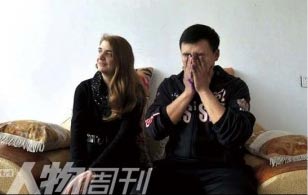The recent travails of a Shandong man named Xu Shuai illustrate the extent to which China’s rural citizens are at the mercy of corrupt local officials and the measure of protection provided by foreign connections.
Xu met a young British woman named Joanne Noble in 2009 while working in Vladivostok, the lone port of the Russian far east, according to Southern Metropolis Daily. Xu, then 28, apparently spoke both English and Russian. After the couple married, Xu applied for a visa to live in the UK. His visa application was denied three times, and they decided to live with Xu’s family in Dongwangsong Village in a rural area of Shandong province in eastern China.
In 2011, while Joanne was in London to give birth to the couple’s first child, Xu’s father received a call from the District Party Committee saying that the family land had been acquired for 700 yuan ($114) a mu (about 6,458 square feet), or about $696 per acre. That was only a tiny fraction of the value of land which was then producing 1,500 to 3,000 yuan a year per mu.
Efforts by Xu’s father to negotiate a higher compensation were rebuffed with threats of arrest unless the land was turned over within three days. Xu turned to the public public security bureau and the land bureau. They said nothing could be done without evidence of wrongdoing.
Joanne, still in London with their daughter, publicized the Xu family’s plight. Overseas journalists began seeking an interview with Xu. Fearing foreign media publicity, local officials told Xu they would leave the family’s land alone if he kept quiet about his complaints.
The officials nursed a grudge against the Xu family for causing trouble.
About a year later Xu’s grandfather paid for a permit to build a house on the family land. When it has half completed, local officials sent a demolition crew to tear it down as the Xu family watched helplessly. The officials insisted the land had already been sold in a heated argument at the site. One of the men insulted Joanne, who was pregnant with their son. Xu kicked him and was slapped with an assault charge. The incident caused Xu’s grandfather to become ill. He died two months later, a few days after Xu’s son was born.
The couple went to the Weifang City Complaints Bureau to air out their grievances.
“If you’re so capable, why don’t you complain to the British Embassy?” the office told them.
That night Xu’s family was roughed up at home by a group of strange men. They called the police only to be told, “Xu Shuai, don’t stir up any more trouble. You’ve already got an unresolved case on your record.”
In April, around the time of the Qingming Festival, Xu and Joanne tried to petition the district government. They were forced to leave without filing the petition because of the hostility of onlookers who accused Xu of using his “foreign wife” to attract attention.
The bad experiences have made Joanne fearful for her family’s safety. She has been wanting to return to England but doesn’t want to leave Xu alone.
“My wife is not stupid,” Xu told the Daily. “She knows that if she leaves, I will be arrested.”
Xu now faces a difficult dilemma. Joanne and their daughter can return to England any time but their son was born in China and can’t leave without an exit visa. Even if he were to obtain one, stringent new British immigration policies may not let Xu join them. He is also reluctant to leave behind his aging parents who want his family to stay. But Xu is now convinced that their future will be much brighter in England.


